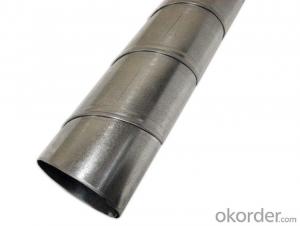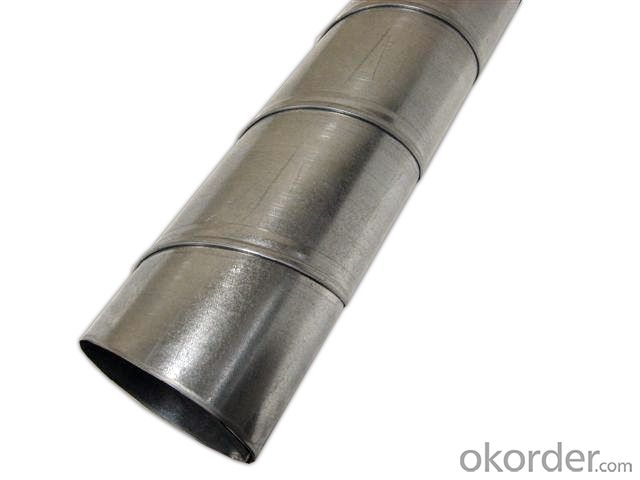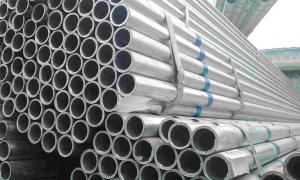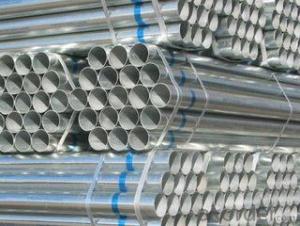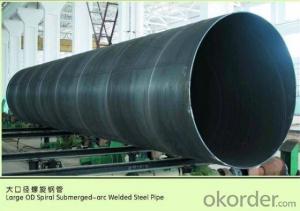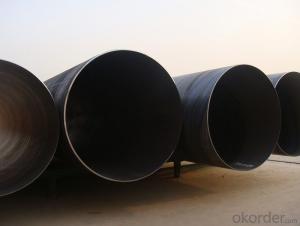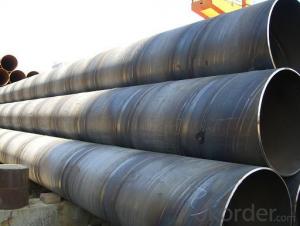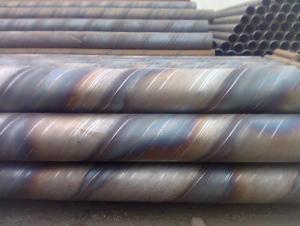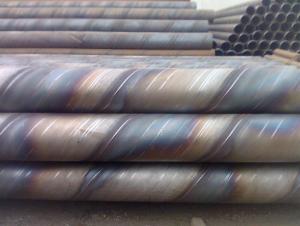SPIRAL WELDED STEEL PIPE 32/36/38/46'' CARBON
- Loading Port:
- Tianjin
- Payment Terms:
- TT OR LC
- Min Order Qty:
- 5 m.t
- Supply Capability:
- 3000 m.t/month
OKorder Service Pledge
OKorder Financial Service
You Might Also Like
Packaging & Delivery
Packaging Detail: | standard export packing or as customer's requirement |
Delivery Detail: | within 10 - 30 days |
Specifications
Spiral Welded Steel Pipes and Tubes
1.Material:Q195-Q235
2.Length:1-12m
3.WT:1.0-14mm
4.O.D.:20-273mm
Spiral Welded Steel Pipes and Tubes
Product Description:
1.Material : Q235,Q345,L245,L290,L360,L415,L450,L485,GrB,X42,46,X52,X56,X60,X65,X70,X80,X100
2,Standard: SY/T5037-2000,GB/T9711-2011,API Spec 5L PSL1/PSL2,ASTM A252\A53,ISO3183,DIN17172,EN10217,JIS G3457,AWWA C200,ASTM A139,ASTM A671,ASTM A672
3.Wall thickness: 3.0mm-30mm
4.Outer diameter: φ168mm-3020mm
5,Length: 5m-12m or as your requirement
6,Corrosion protection standard: DIN30670,DIN30671, AWWAC210, AWWA C203, SY/T0413-2002,SY/T0414-2002
7,Application: Oil, gas, natural gas, water pipe, thermal electricity pipe, steel structure engineering, etc
Q195-q345 Material Steel Pipe's Materials
Elements | Chemical Compsition% | Mechanical Property | ||||||
C% | Mn% | S% | P% | Si% | Yield Point (Mpa) | Tensile Strength(Mpa) | Elongation | |
Q195 | 0.06-0.12 | 0.25-0.50 | <0.050< span=""> | <0.045< span=""> | <0.030< span=""> | >195 | 315-430 | 32-33 |
Q215 | 0.09-0.15 | 0.25-0.55 | <0.05< span=""> | <0.045< span=""> | <0.030< span=""> | >215 | 335-450 | 26-31 |
Q235 | 0.12-0.20 | 0.30-0.70 | <0.045< span=""> | <0.045< span=""> | <0.030< span=""> | >235 | 375-500 | 24-26 |
Q345 | <0.20< span=""> | 1.0-1.6 | <0.040< span=""> | <0.040< span=""> | <0.55< span=""> | >345 | 470-630 | 21-22 |
Packaging & Delivery
Packaging Detail: | Normal exporting packing,in container or bulk vessel or as per clients' request |
Delivery Detail: | 2 months after confimed contract |
Specifications
Large Diameter API 5L X70 PSL2 LSAW Steel Pipe
Grade: X42, X46, X50, X52, X60, B, C
OD: 1.5"-28"
WT: SCH10-SCH160
Brand:TPCO
Large Diameter API 5L X70 PSL2 LSAW Steel Pipe
Specifications:
u Standard: API 5L
u Grade: B, C, X42, X46, X50, X52, X56, X60, X65, X70, X80
u OD: 1.5"-28"
u WT: SCH10-SCH160
u Length: 5-12m
u Ends Finish: plain end, bevel end, grooved end
u Surface Treatment: bare, black varnished, oiled finish, red color, anti-corrosion, 3PE, FBE or epoxy coating
u Technique: hot rolled or cold drawn
u Application: api 5l steel pipe for conveying oil, water, gas
u Invoicing: based on theoretical weight or actual weight
u Payment Terms: L/C at sight, T/T or Western Union
u Trade Terms: FOB, CFR, CIF
u Certification: ABS manufacturing assessment, ABS design assessment, API 5CT, API 5L, DNV manufacturer certificate, ISO9001 quality management system certificate, ISO14001 environment management system certificate, GB/T28001 occupational health and safety management system certificate, A1 class manufacturing license of special equipment certificate, CCS, GL, LR, SGS, TüV, PDE
- Q: What is the difference between steel pipe and fiberglass pipe?
- Steel pipe and fiberglass pipe differ in terms of their material composition, flexibility, resistance to corrosion, and cost. Steel pipe is made of an alloy of iron and carbon, known for its strength and durability, making it a popular choice for plumbing, construction, and industrial projects. In contrast, fiberglass pipe is composed of glass fibers embedded in a resin matrix, resulting in a lightweight and corrosion-resistant material suitable for applications requiring chemical resistance. Another contrasting factor between steel pipe and fiberglass pipe is their level of flexibility. Steel pipe is rigid and stiff, while fiberglass pipe offers greater flexibility, allowing it to bend and conform to different shapes and contours. This flexibility makes fiberglass pipe easier to install in tight spaces or areas with complex geometries. Corrosion resistance is another significant difference between the two materials. Steel pipe is susceptible to corrosion, particularly in environments with high moisture or chemical exposure. To counteract this, steel pipes are often coated or lined with corrosion-resistant materials. In contrast, fiberglass pipe is inherently resistant to corrosion due to its construction, making it a preferred choice for applications in saltwater environments or chemical processing plants. Cost is yet another factor that sets steel pipe and fiberglass pipe apart. Generally, steel pipe is more affordable than fiberglass pipe, especially for smaller diameter pipes. However, as the diameter and pressure rating increase, the cost of steel pipe can exceed that of fiberglass pipe. Additionally, fiberglass pipe requires less maintenance and has a longer lifespan, which can offset the initial cost difference over time. In conclusion, the differences between steel pipe and fiberglass pipe can be summarized in terms of their material composition, flexibility, corrosion resistance, and cost. The choice between these two types of pipes depends on various project requirements, including the application, environment, budget, and expected lifespan.
- Q: ASME seamless tube how to express, what is the form, I did not find on the ASME, thank God!
- Seamless steel pipe, welded steel pipe, then its means of expression is: nominal diameter refers to the outer diameter (diameter * wall thickness), the unit is mm. [for example, seamless steel tubes of phi 32 * 3. It means that the nominal diameter (outside diameter) is seamless steel pipe of phi 32mm and wall thickness 3mm.
- Q: Are steel pipes suitable for nuclear power plants?
- Yes, steel pipes are suitable for nuclear power plants. Steel is a commonly used material in the construction of nuclear power plants due to its excellent mechanical properties, high strength, and durability. Steel pipes are used in various applications within these plants, including the transportation of cooling water, hot gases, and steam. The steel used in nuclear power plants is carefully selected and tested to meet stringent safety regulations and quality standards. It is crucial for these pipes to have excellent resistance to corrosion and high-temperature environments, as they are exposed to harsh conditions such as high pressure, high temperatures, and radioactive materials. Furthermore, steel pipes have a long service life and require minimal maintenance, making them a cost-effective choice for nuclear power plants. They can withstand extreme conditions, ensuring the safe and reliable operation of the plant. Additionally, steel pipes can be easily fabricated, installed, and repaired, which is essential for the efficient functioning of a nuclear power plant. Overall, steel pipes are highly suitable for nuclear power plants due to their strength, durability, resistance to corrosion, and ability to withstand extreme conditions.
- Q: What is the difference between hot dip galvanized steel pipe and galvanized steel pipe?
- The difference between the process is that the hot dip galvanized pipe is dipped in the molten zinc bath and the galvanized pipe is plated with a metallic surface by means of unidirectional current in the plating bath. Hot plating process is fast, the coating is thick and consumes more zinc. Ordinary galvanized slow speed, thin coating.
- Q: What is the difference between internal coating and external lining of steel pipes?
- The main difference between internal coating and external lining of steel pipes lies in their purpose and location. Internal coating refers to the application of protective materials on the inner surface of the steel pipe, primarily to prevent corrosion, improve flow efficiency, and maintain the quality of transported fluids. On the other hand, external lining involves applying protective materials to the outer surface of the steel pipe, mainly for corrosion resistance, insulation, and protection against external elements. Therefore, while internal coating focuses on the interior protection and performance of the pipe, external lining shields the pipe from environmental factors and external damage.
- Q: How are steel pipes used in the pharmaceutical industry?
- Steel pipes are commonly used in the pharmaceutical industry for various purposes, such as transporting liquids and gases, transferring raw materials and finished products, and providing a reliable and durable infrastructure for the pharmaceutical manufacturing process.
- Q: How to distinguish seamless pipe and welded pipe?
- The way to distinguish seamless pipes and welded pipes is to see if there is weld marks on the port.
- Q: What's the difference between a rectangular tube and a rectangular steel tube?
- Rectangular tube is a kind of hollow long strip steel, also known as flat tube, flat square tube or square flat tube (Gu Mingsiyi). A large amount of pipe used to transport fluids, such as petroleum,Natural gas, water, gas, steam, etc., in addition to bending and torsional strength of the same weight is lighter, so it is also widely used in the manufacture of machinery parts and engineering structures. It is also used to produce all kinds of conventional weapons, guns, shells and so on.
- Q: What are the safety precautions when working with steel pipes?
- When working with steel pipes, it is important to follow safety precautions to minimize the risk of accidents and injuries. Some key safety measures include wearing appropriate personal protective equipment (PPE) such as gloves, safety glasses, and steel-toed boots to protect against cuts, burns, and falling objects. It is crucial to use proper lifting techniques or equipment when handling heavy steel pipes to avoid strains or back injuries. Additionally, workers should be cautious of potential hazards such as sharp edges, welding sparks, or exposure to hazardous materials. Regular inspection and maintenance of equipment and tools is necessary to ensure their safe operation. Proper training, awareness of surroundings, and adherence to safety protocols are essential for a secure working environment when dealing with steel pipes.
- Q: How are steel pipes used in construction?
- Steel pipes are commonly used in construction for various purposes such as structural supports, plumbing systems, and underground utility installations. They provide strength, durability, and resistance to corrosion, making them ideal for carrying fluids, gases, and other materials. Additionally, steel pipes can be easily welded, allowing for efficient and secure connections in building frameworks and infrastructure.
Send your message to us
SPIRAL WELDED STEEL PIPE 32/36/38/46'' CARBON
- Loading Port:
- Tianjin
- Payment Terms:
- TT OR LC
- Min Order Qty:
- 5 m.t
- Supply Capability:
- 3000 m.t/month
OKorder Service Pledge
OKorder Financial Service
Similar products
Hot products
Hot Searches
Related keywords
